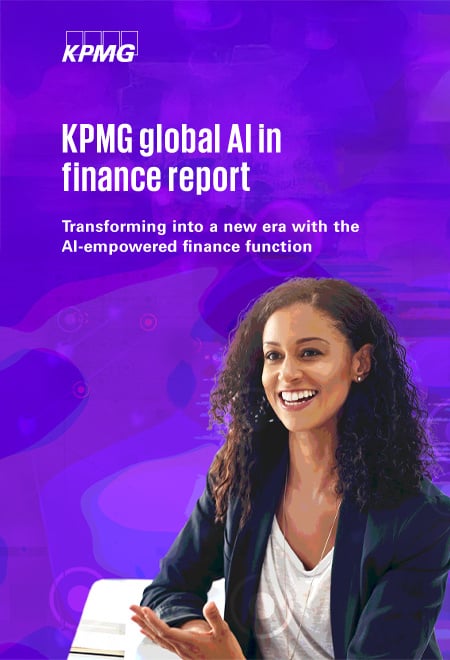To what extent is artificial intelligence (AI) already being used by companies in the financial sector? And which positive aspects, from optimised data analysis to cost efficiency, are particularly in focus? The ‘KPMG global AI in finance report’ study provides the answers. One key finding: despite investing in traditional AI technologies, including rule-based systems without their own learning function and static algorithms, companies derive the greatest benefit from machine learning, deep learning and generative AI. In this area, the return on investment (ROI) is either in line with expectations - or even exceeds expectations.
Chief Financial Officers (CFOs) and other finance executives from 2,900 companies in 23 countries and territories and six industries were surveyed for the study. The analysis of the results shows that companies are introducing AI in other areas of finance, including accounting, financial planning, treasury management, risk management and tax management.
300 company managers from Germany took part. The results revealed various differences between the German and international markets.
Half of those surveyed plan to use AI in financial reporting. The targeted selection of specific use cases is becoming increasingly more important than broad implementation.
What companies should do now:
Compared to our 2024 edition of the study, the companies surveyed increasingly report a selective use of AI. Companies should implement the best use cases first. This enables efficient use of resources. Here it is particularly important
Chart (in German)

The significant increase in the use of AI (from 42 to 49 percent) and generative AI in particular (from 13 to 21 percent) shows that companies are increasingly relying on innovative technologies to optimise their financial processes.
What companies should do now:
Companies should integrate AI technologies into their financial processes to enable automation, efficiency and deeper data analyses. In this context, the further education and regular training of employees in the use of AI technologies is a key success factor.
Chart (in German)

German companies prioritise generative AI more strongly (52 per cent) than the global average (45 per cent) and also rely on proven and innovative technologies to increase their efficiency when it comes to traditional AI (45 versus 37 per cent).
What companies should do now:
As German companies prioritise AI technologies more than the global average, they can strengthen their position in international competition through early implementation and the creation of an AI-friendly corporate culture.
Chart (in German)

Over the next three years, the proportion of IT budgets for AI in German companies will increase significantly, which indicates increased investment in the optimisation of business processes.
What companies should do now:
Companies should invest the higher budgets in specific AI applications and use cases that achieve a high level of benefit. Strategic partnerships can help with the selection of applications and use cases and then with their successful development and implementation.
Chart (in German)

The majority of companies are achieving a positive ROI on AI initiatives in finance, indicating an underestimation of the effects and better than expected results - despite some challenges.
What companies should do now:
Companies should analyse successful AI initiatives in order to identify success factors and apply these findings to future projects. At the same time, it is important to analyse the reasons for less successful initiatives and share best practices and experiences to overcome challenges.
Chart (in German)

The increase in the evaluation of controls for the AI used from 18 to 23 per cent within six months shows a sharp rise in demand for service provider certificates.
What companies should do now:
When selecting external service providers for certification and attestation services, companies should pay particular attention to a deep understanding of the technology used as well as the environment and objectives of the company placing the order. The service provider's experience with the project or product favours smooth cooperation.
Chart (in German)

A more detailed review of the control environment is desired by 61 per cent of respondents, while 43 per cent expect an assessment of the maturity of AI governance and 35 per cent expect third-party confirmation on the use of AI.
What companies should do now:
Our survey shows that organisations regularly review and improve their internal control mechanisms to ensure that they meet current standards. For this purpose, experienced, professionally trained external auditors should be brought in to conduct a detailed review of the control environment and identify weaknesses.
Chart (in German)

Almost 60 per cent of those surveyed stated that demonstrable experience and success are the most important factors when selecting service providers for AI solutions.
What companies should do now:
The vendor strategy is a key success factor in the implementation of AI applications. It is therefore crucial to regularly adapt and review your own strategy.

Determine your AI maturity now
How AI-fit is your finance function? Find out now.
With the KPMG AI in Finance Maturity Benchmarking Tool, you can determine the maturity level of your finance function for the AI transformation in just a few minutes. Compare yourself with the industry average and identify specific next steps.
Further information
Your contacts
Stay up to date with what matters to you
Gain access to personalized content based on your interests by signing up today
Sebastian Stöckle
Global Head of Innovation and AI, Audit, KPMG International and Audit CTO, KPMG Germany
KPMG AG Wirtschaftsprüfungsgesellschaft
Connect with us
- Find office locations kpmg.findOfficeLocations
- kpmg.emailUs
- Social media @ KPMG kpmg.socialMedia






